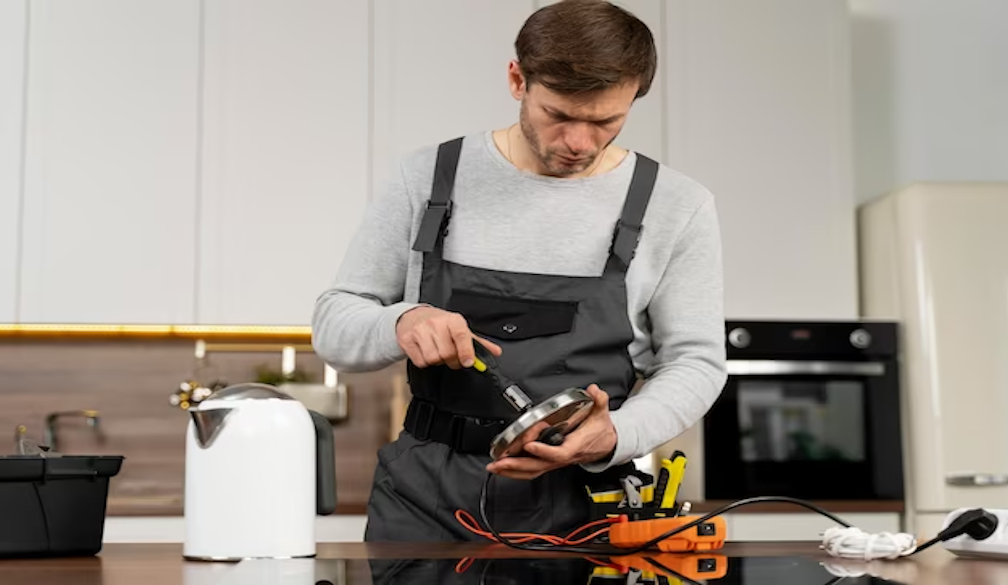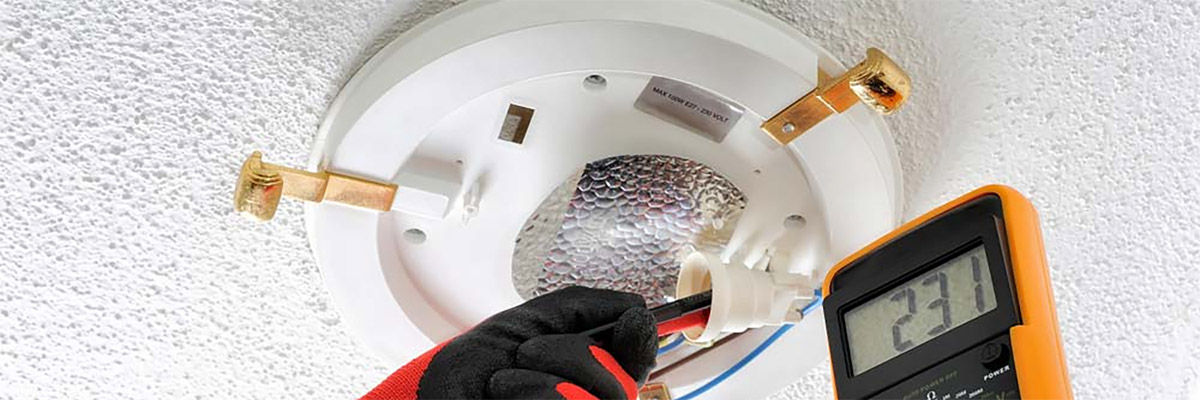Common Electrical Troubles Every Property Owner Need To Find out about
Property owners often come across different electric issues that can affect security and functionality. Issues like flickering lights and tripped circuit breakers are more usual than lots of understand. These scenarios can indicate deeper electrical issues that warrant focus. Understanding the signs and threats connected with obsolete wiring and dead outlets is important. What steps can be taken to protect against these issues? Checking out these typical electric concerns might disclose vital understandings for keeping a secure home setting.

Flickering Lights: Reasons and Solutions
Why do some property owners experience flickering lights? Flickering lights can be a common annoyance, commonly showing underlying electrical problems. One main cause is faulty or loosened links within lights or circuitry, which can bring about periodic power supply. Additionally, making use of high-wattage appliances on the very same circuit might trigger voltage variations, resulting in flickering or dimming. Another prospective problem is an overloaded circuit, where way too many gadgets attract power concurrently, straining the electrical system. Obsolete or degraded circuitry can add to irregular electric flow. In some situations, flickering lights may indicate a problem with the home's electric panel or solution line. Home owners should attend to flickering lights immediately to prevent prospective threats. Solutions might include tightening up connections, rearranging device load, or getting in touch with an accredited electrical expert for a thorough evaluation. Recognizing the root cause can aid ensure a stable and secure electrical system in the home.
Tripped Circuit Breakers: What You Need to Know
Have house owners ever before wondered what causes their circuit breakers to trip unexpectedly? This common issue usually occurs from an overload of electrical circuits, where as well numerous devices draw power concurrently. In such cases, the breaker works as a safety and security device, disrupting the flow of electricity to avoid overheating and possible risks. Another frequent cause is a brief circuit, which takes place when a live wire contacts a neutral cable, developing a surge of electrical energy that trips the breaker. Ground mistakes can also bring about tripped breakers; these happen when an online cable touches the ground or a grounded surface, posturing major security dangers. Property owners need to on a regular basis analyze their use of high-wattage home appliances to stay clear of overloading circuits. Additionally, comprehending the feature of circuit breakers can aid them react properly throughout a trip, ensuring their home stays secure and well-maintained.
Outdated Wiring: Threats and signs
Outdated circuitry can present substantial dangers to homeowners, frequently going undetected till issues occur. Homes built before the 1980s might still have aluminum circuitry or knob-and-tube systems, which are no more considered secure. Indications of outdated wiring consist of flickering lights, regularly stumbled circuit breakers, or burning scents near outlets. These indications might suggest that the electrical system is overburdened or deteriorating.Additionally, property owners might see swelter marks around switches or electrical outlets, which can indicate overheating. The risk of electric fires noticeably raises with outdated wiring, as these systems were not made to manage modern electric loads. Home owners are urged to have their circuitry checked routinely, especially when remodeling or including new home appliances. By acknowledging these indications early, they can avoid hazardous scenarios and preserve a more secure living setting. Upgrading to current electric criteria is a proactive action in preserving home security and effectiveness.
Often Blown Fuses: Troubleshooting Tips
Constant blown merges can indicate underlying electric concerns that might originate from out-of-date electrical wiring or overloaded circuits. Property owners experiencing this trouble ought to first determine the appliances attached to the influenced circuit. It is recommended to prevent making use of several high-wattage tools simultaneously, as this can result in circuit overload. If the issue persists, examining the circuit box for indicators of wear or damages is vital; a defective fuse box might require replacement.Additionally, looking for loosened links within the circuit can aid prevent future occurrences. Homeowners should likewise validate that the integrates being made use of are of the proper amperage, as using an inaccurate fuse can worsen the problem. If these troubleshooting suggestions do not settle the concern, seeking advice from a certified electrical expert is recommended to evaluate the electric system further. Resolving these issues promptly can help reduce threats and ensure the security of the home's electrical infrastructure.
Dead Outlets: Usual Causes and Solutions
When a house owner experiences a dead outlet, it can usually be a source of disappointment and complication. A number of common causes may cause this issue. One constant perpetrator is a stumbled circuit breaker, which can be easily reset. Property owners ought to examine their electrical panel to check if any kind of breakers are in the off setting. An additional possibility is a malfunctioning outlet itself, which may need substitute. Furthermore, loose wiring connections within the outlet can interfere with power circulation, making evaluation essential.Sometimes, the trouble might come from an overloaded circuit, specifically when several gadgets are connected. In such cases, rearranging the electrical tons can resolve the problem. Property owners need to likewise think about the age of their electrical wiring; older systems may require updates to fulfill modern-day electric demands. If these actions do not remedy the scenario, seeking advice from a qualified electrical expert is advisable to assure security and appropriate diagnosis.
Electrical Shocks: When to Be Worried
How can property owners establish whether an electrical shock warrants problem? House owners should initially analyze the seriousness and context of the shock. A light fixed shock, frequently felt when touching steel objects, is usually harmless and usual. If the shock occurs while communicating with a plugged-in appliance or electrical outlet, it might suggest an extra significant issue.The area and frequency of the shocks are crucial. Repetitive shocks from the exact same source, particularly in wet locations like bathrooms or kitchens, can signify malfunctioning circuitry or best site poor grounding. Homeowners must additionally consider the experience of the shock; a jolt that causes pain or contraction is extra worrying than a plain tingle.If there's any type of unpredictability, it is advisable to seek advice from a qualified electrical contractor. Disregarding potential electric threats can lead to serious safety and security threats, consisting of fire or extreme injury.
Overloaded Circuits: Prevention and Safety And Security Measures
Overloaded circuits posture substantial dangers in household setups, typically leading to electric fires or devices damage (Sydney Level 2 Electrician). House owners must acknowledge the indications of an overloaded circuit, such as regularly tripped breakers or dimming lights. Carrying out preventive safety and security practices can assist mitigate these risks and guarantee a safer living environment
Recognizing Overloaded Circuits
What indicators indicate that a circuit may be strained? House owners must be cautious for a number of vital indicators. Frequently tripped circuit breakers or blown fuses recommend too much tons on the circuit. Lowering or flickering lights, particularly when other home appliances remain about his in use, can signify an insufficient power supply. Furthermore, electrical outlets or buttons that feel warm to the touch might indicate getting too hot, a potential fire hazard. Uncommon buzzing sounds from electrical outlets additionally warrant focus, as they can indicate electrical problems. Finally, if appliances run inefficiently or fail to start, it may be an indicator of an overloaded circuit. Identifying these indicators early can assist protect against major electrical issues and promote a safer home setting.
Preventive Security Practices
To maintain a safe and efficient electric system, house owners must apply preventative safety practices that resolve prospective circuit overloads. One effective measure is to prevent attaching a lot of devices to a single outlet, as this can surpass the circuit's capacity. Using power strips with integrated circuit breakers can help disperse power safely. Property owners ought to likewise on a regular basis examine cords and home appliances for damage and change any kind of defective tools immediately. It is important to assure that circuit breakers are functioning correctly and to be knowledgeable about the total electrical power being used in each circuit. Furthermore, consulting a certified electrical expert for routine assessments can recognize prospective concerns prior to they intensify, assuring a more secure living environment and lengthening the lifespan of electric systems.
Often Asked Questions
Just how Typically Should I Have My Electrical System Inspected?
Regular assessments of electric systems are recommended every three to five years. Property owners should think about more regular checks if they experience problems, take on improvements, or stay in older buildings to guarantee safety and security and conformity.
Can I Deal With Electrical Troubles Myself or Hire an Expert?

What Are the Signs of an Electric Fire Risk?
Signs of an electrical fire risk consist of frequently look at here now tripped breaker, flickering lights, shedding odors, stained outlets, or warm, buzzing cords. Property owners ought to remain watchful and look for professional aid if any of these indications are present.
Just how Do I Know if My Home Requirements an Electric Upgrade?
To determine if a home requires an electrical upgrade, signs include regular breaker trips, out-of-date electrical wiring, insufficient outlets, flickering lights, and the existence of older electrical panels, suggesting possible security risks and inadequacy.
Exist Particular Security Tips for Do It Yourself Electric Job?
When considering do it yourself electrical work, one ought to always shut off power, make use of protected tools, validate circuit performance, follow regional codes, and get in touch with specialists for intricate jobs to assure safety and stop crashes. Another potential concern is an overloaded circuit, where as well several tools attract power concurrently, straining the electrical system. The threat of electrical fires significantly raises with obsolete electrical wiring, as these systems were not made to take care of modern-day electric loads. Constant blown merges can show underlying electrical problems that might stem from outdated circuitry or overloaded circuits. To maintain a reliable and safe electrical system, homeowners should execute preventive security practices that deal with prospective circuit overloads. ASP Level 2 Electrician. Signs of an electric fire danger include frequently tripped circuit breakers, flickering lights, burning smells, stained electrical outlets, or cozy, humming cables